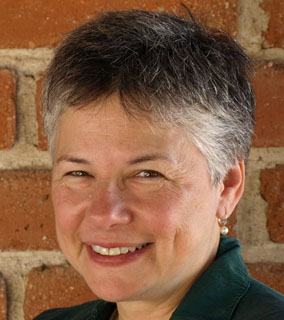Katharine Weber appeared on The Bat Segundo Show #317. Ms. Weber is most recently the author of True Confections. She previously appeared on The Bat Segundo Show #130 with Levi Asher. Ms. Weber and Mr. Asher will be appearing at the Greenlight Bookstore on January 11, 2009 at 7:30 PM.
(Please note: The Bat Segundo Show has discovered a rare and rather alarming remix of the infamous Little Sammies television commercial by a rather untalented 27-year-old DJ, who goes by the name “DJ Danger Titmouse,” presently living in San Ramon, California with numerous unemployed members of his extended family. We have appended this remix to the beginning of this show for educational purposes and to aid wiser heads in taking any appropriate precautionary measures.)
Condition of Mr. Segundo: Hungover from dangerous activities.
Author: Katharine Weber II
Subjects Discussed: The relationship between authenticity and telling a divagating family tale, Alice’s concerns with childhood culture vs. being the guardian of childhood culture, lexical blending, Weber’s anticipation of Twitter, the origins of concepts based on words, Howdy’s relationship with George W. Bush, firstborn sons and leaders, fixed societal positions and family business, combining facts and invention to depict candy-making procedures, the problem with concentrating upon factories, the Madagascar Plan, Michael Chabon’s The Yiddish Policemen’s Union, chocolate, how predetermined facts can be twisted and made credible, perceptions buttressed by media presence, the science of white chocolate, the many strange real names of candy bars, the Chicken Dinner bar as a surrogate meal during the Great Depression, Staircase Writing, the many ways in which Weber never tired of candy, attending a candy convention, adjacent reading, “Sweet Old World,” terrified candy magnates who hide behind handlers, tight-lipped people at Hershey, Tootsie Roll’s Ellen Gordon vs. Lauren Bacall, Joyva Halvah, easily offended readers, the myth of writer’s block, and cheating on therapists.
EXCERPT FROM SHOW:
 Correspondent: I wanted to ask about the many interesting aspects of candymaking that are throughout this book. Alice herself says that most candy factories have very tight security. You, I know, did some research. And I’m wondering how you managed to get many of these morsels into the actual book, and whether a lot of this is fabricated and a lot of this is speculation.
Correspondent: I wanted to ask about the many interesting aspects of candymaking that are throughout this book. Alice herself says that most candy factories have very tight security. You, I know, did some research. And I’m wondering how you managed to get many of these morsels into the actual book, and whether a lot of this is fabricated and a lot of this is speculation.
Weber: A lot of it is made up. A lot of it is YouTube. Candy companies have websites. There are incredible numbers of candy blogs, and I have certainly spent time reading them all. I’ve never set foot in a candy factory.
Correspondent: Aha!
Weber: But two of my favorite television shows are Unwrapped and How It’s Made. And you can sit me down in front of a TV where there’s a documentary on how they make Venetian blinds and I would probably watch it avidly. I love factories. I love manufacturing. And there’s something just utterly fantastic to me about how that truly American ingenuity, that kind of mid-century ingenuity, of making machines that made things — that made this country great. Seriously, it’s sort of an autistic side of myself. I remember my kids being born, but I was avidly glued to an episode of Mister Rogers, which was an episode to the Crayola factory. I just couldn’t get enough of it.
Correspondent: I remember those too.
Weber: Just loved it.
Correspondent: I’m wondering if you were reluctant to visit a factory. Whether this actually was a prohibition. Because if you stepped foot into the factory, some imaginative possibility would be sullied.
Weber: Absolutely. I also, on a very practical level, didn’t want to be writing about a factory. I wanted to be writing about Zip’s Candies. And if I were to visit any candy factory, then I would be writing about that candy factory. And I don’t want people thinking I’m writing about a known company, a known family. But also I indeed wanted to be able to just make it up in my head. The one factory that I have been in that did inspire this story was actually my husband’s family’s printing company, which is no longer in the family. Because my husband is the third generation who didn’t want to run the business. And so it was sold. But it was the classic case. His father was an employee who married the boss’s daughter and then grew the business. But Fox Press in Hartford was about the same scale as Zip’s Candies. About the same size number of employees. The same kind of factory setting in a certain way. And so, although it was a printing company and they’re not making candy in there, I think physically, in my head, the kinetic memories and the experience, the sounds, the machines, were a model in some ways.
Correspondent: There’s also an instance involving the Madagascar Plan, the famous Nazi effort to get the Jews…
Weber: Is it famous? Because most people I know that are perfectly educated, thoughtful people have never heard of the Madagascar Plan.
Correspondent: Wow. It’s there.
Weber: It’s fascinatingly unknown.
Correspondent: It’s there in…
Weber: It happened. It’s real. I did not make up the Madagascar Plan.
Correspondent: Well, the question I have is this notion of a Jewish bakery owner, who pretends to be German or who has managed to have his Jewishness ignored by the authorities,
Weber: He pretends to be a non-Jew. A safe Hungarian.
Correspondent: Yeah. The question is: Was this based off of the so-called Jewish specialists who Eichmann had round up in the efforts to determine how they would actually engage this plan, which they never actually did. They decided to go ahead with the Final Solution.
Weber: It wasn’t that organized in my thoughts. It was really kind of confabulated. Of course, it’s not my telling how Julius Kaplinsky got himself to Madagascar, thinking he was getting ahead early, ahead of the crowd, to get established before the other four million Jews of Europe showed up. It’s Alice’s telling of Julius Kaplinsky going to Madagascar.
Correspondent: With speculations too.
Weber: And she admits that she basically had no idea how he got there. But this is what she thinks. And then she goes back into telling the story very authoritatively. But it’s an utterly fascinating interlude. It’s very much what might have been. I mean, if I were writing a nonfiction book about the Madagascar Plan — and somebody should, by the way; there is no such book — I know what the title would be, which would be The First Solution. Because when the Madagascar Plan was a happening thing, the Third Reich stopped work on the Warsaw ghetto. They stopped transports into Poland. They were going to ship the Jews of Europe to Madagascar. But they needed to win the Battle of Britain to have the British naval fleet. Because that was the piece of this plan. They needed those boats to ship the Jews. And when it didn’t go their way, when the Battle of Britain just didn’t really work out so well with the Third Reich, they turned away from the Madagascar Plan, resumed transports, finished the Warsaw ghetto, and began working on the Final Solution.
So it’s an incredible alternate history. Michael Chabon’s The Frozen Chosen in The Yiddish Policemen’s Union. Or we could all be sitting under palm trees in Madagascar. Under baobab trees. And, of course, for me, Madagascar signifies hugely. Because chocolate — and this is a novel about chocolate, chocolate, chocolate — chocolate grows within twenty degrees of the equator all the way around the globe. And some of the finest chocolate on this planet comes from Madagascar. So it knits back into the story.
BSS #317: Katharine Weber II (Download MP3)
